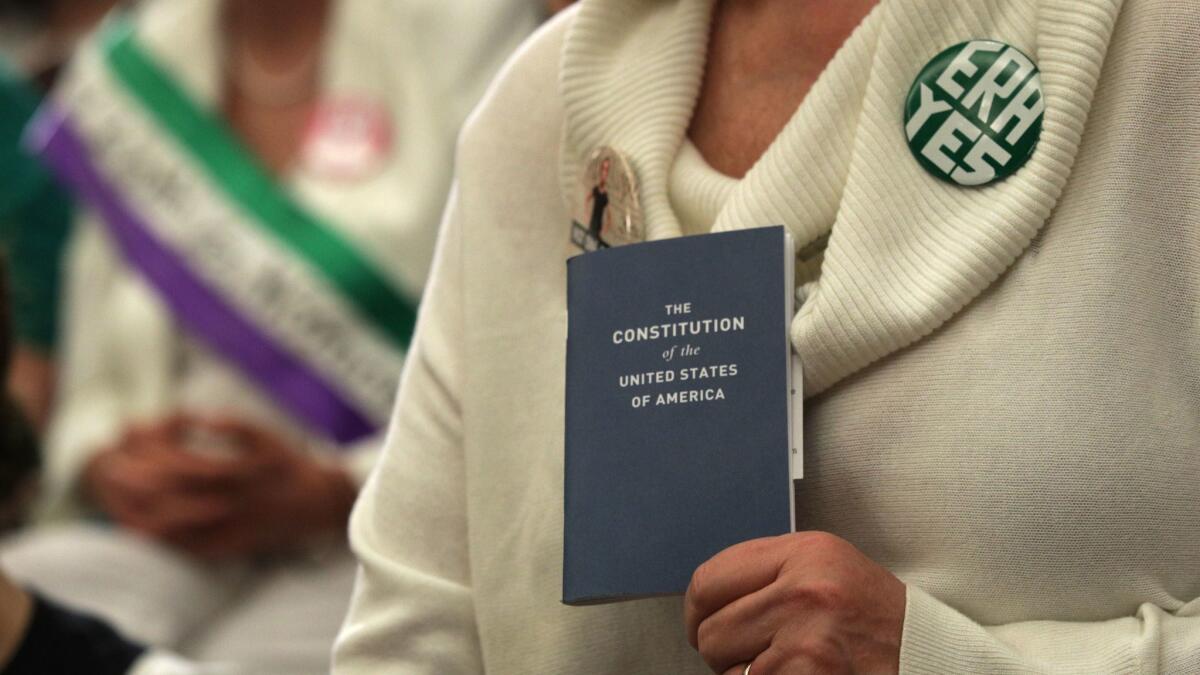House votes to remove Equal Rights Amendment deadline, but Senate approval remains unlikely

WASHINGTON — House lawmakers voted Thursday to remove the deadline for states to ratify the Equal Rights Amendment, legislation that would enshrine in the Constitution a ban on sex discrimination.
The measure, however, is unlikely to receive approval from the Republican-controlled Senate, and earlier this week took a major hit when Justice Ruth Bader Ginsburg repeated her view that recent state ratifications came too late.
The 1972 legislation originally required that 38 states ratify the ERA in seven years, though the deadline was later pushed to 1982. By then, however, only 35 states had ratified.
The effort stalled until the 2016 election of Donald Trump spurred liberal activism, the Women’s March and women running for public office. Nevada in 2017 became the 36th state to ratify. Illinois in 2018 followed suit. And in January, the Virginia Legislature approved it -- becoming the 38th state.
The resolution’s primary co-sponsor California Rep. Jackie Speier said the vote “made it clear that progress and justice cannot be stopped and that righteousness still prevails in our proud democracy.”
“For those who question the need for the ERA, they need look no further than the gender wage gap that continues to keep women and families from achieving their full potential, pregnancy discrimination that forces women out of the workforce, persistent and insidious violations of the rights of survivors, and much more,” she added.
Senate Majority leader Mitch McConnell has not said he would take up the resolution’s companion, which was introduced by Sens. Ben Cardin (D-MD) and Senator Lisa Murkowski (R-AK).
Republicans have criticized the move, saying it is unnecessary because of court rulings over the past 30 years and illegal as it would retroactively approve the legislation.
“Congress does not have the constitutional authority to retroactively revive a failed constitutional amendment and subject citizens in all 50 states through the current political trend in just one state,” said Rep. Doug Collins (R-Ga.).
On Monday, Ginsburg spoke at the Georgetown University Law Center and repeated her view that the recent ratifications came too late. “There is too much controversy about latecomers,” she said. The votes by Virginia, Illinois and Nevada came “long after the deadline passed.... I would like to see a new beginning. I’d like it to start over.”
Republicans on Tuesday morning pounced on her statement.
“Democrats must abandon the expired 1972 ERA and start this process over again,” the GOP members of the House Judiciary Committee tweeted above an image quoting Ginsburg. “All states need to have the chance to reconsider its ratification.”
In the 1970s, five states — Kentucky, Nebraska, Tennessee, Idaho and South Dakota — voted to revoke their ratifications. The courts have yet to rule on if states can rescind ratification.
Decades ago when the debate over ratification raged, conservatives intertwined it with abortion. Anti-abortion activists regard the House bill as an attempt to enshrine the right to abortion in the Constitution, saying it would lead to tax-funded abortions.
On Thursday, the president of the anti-abortion group Susan B. Anthony List, Marjorie Dannenfelser, said: “To install a ‘Right to Abortion’ in the U.S. Constitution would be to deny the most basic right upon which our nation was founded: the right to life.”
NARAL Pro-Choice America in its “ERA-YES” campaign said the amendment “would reinforce the constitutional right to abortion” and “would require judges to strike down anti-abortion laws because they violate both the constitutional right to privacy and sexual equality.”
David G. Savage contributed to this report.
More to Read
Get the L.A. Times Politics newsletter
Deeply reported insights into legislation, politics and policy from Sacramento, Washington and beyond. In your inbox three times per week.
You may occasionally receive promotional content from the Los Angeles Times.











